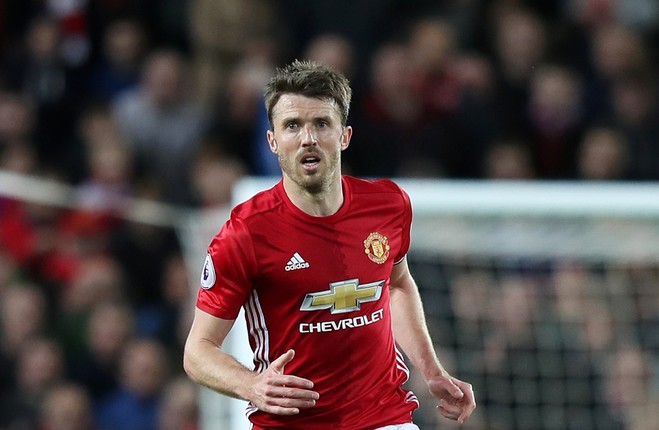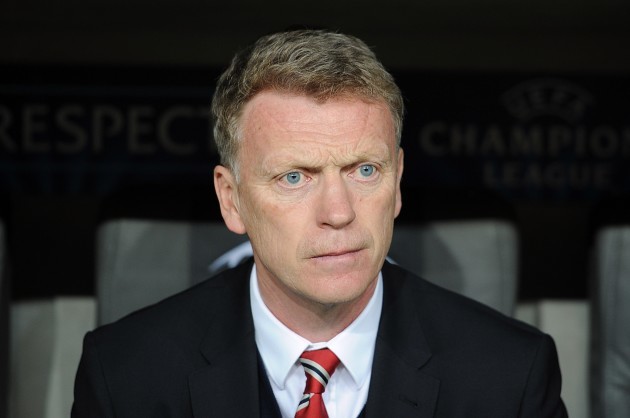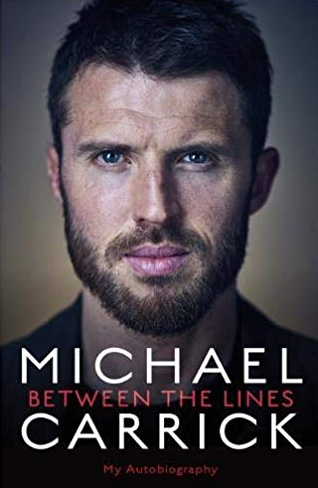THE FOLLOWING PASSAGE is an extract from ‘Between the Lines’ by Michael Carrick.
Sir Alex left a legacy we had to carry on and we owed it to the Boss to continue the success with David Moyes. Even though he wasn’t our manager any more, I still wanted to make Sir Alex proud of us. I was desperate to make it work and knew it was a huge responsibility. David was United’s new manager, and deserved our respect, but making it work with him was also motivated by respect for Sir Alex. I saw how other clubs dealt with managerial changes and they lacked dignity.
We’re Manchester United, I’d like to think we have class and we behave with integrity. And that meant greeting David Moyes with enthusiasm and a resolve to give everything for him.
I got on fine with David, never had a bad word with him, never fell out with him. He arrived full of energy and ideas for how to improve us. I remember at one of his first meetings, David said to us, ‘I believe I can make you better. I know you won the league last year and I’ve obviously been watching you. I can make you run more.’
Being fair to David, he was looking for a chink, like what needed improving and where we were weak, so that he could take us to another level.
I just think what he said didn’t come across the right way. We’d just won the Premier League by 11 points, scored 11 goals more than anybody else, and won a lot of games well, with scores like 3–0, 4–0. Our running stats were never that big anyway but we came from behind to claim 29 points that season so we must have been fairly fit, as well as committed. Our capacity for late goals under Sir Alex showed our endurance physically as well as mentally.
David was right that in terms of ‘distance covered’ we weren’t one of the top sides in the Premier League. But if you look back over the years, all the good years, teams might come to Old Trafford and run a lot more than us, but quite often we ended up winning 2–0, 3–0 or 4–0. Under Sir Alex, we were very efficient with the ball.
It can’t have been easy for David Moyes coming into Carrington where there were so many unwritten rules that had been there for years dictating how everything was done, how to behave, timings, and how you were expected to play. We had to get used to new faces at Carrington. We lost Mick Phelan, Eric Steele and René Meulensteen; in came Steve Round, Chris Woods, Jimmy Lumsden and Phil Neville. We lost good friends and experience.
David did appoint Giggsy as player-coach, but it still felt like Giggsy was more of a player. He still got changed next to me and never really went over to being a proper full-on coach until he’d actually finished playing.
I was surprised David let Mick leave, he didn’t need him to tell him how to do the job, just to guide him and to bounce ideas off. This is not me being disrespectful to David, a manager I admire, I just felt it would have been a good idea to have somebody in the background to lean on at times and get advice from. Being manager of Manchester United is a daunting job with so much to stay on top of.
Training was good and intense under David. He was very hands-on in his approach and his energy and enthusiasm were to be admired. It was a real contrast to before when the Boss never, ever took training as he’d just be on the sidelines, assessing us. David was certainly thorough in his preparation for games, and we did far more work on set-plays than before and he went into far more detail on the opposition. That sort of training was something we’d never really done week to week, normally only for the bigger games.
David was aware that he was surrounded by big characters and experienced winners, and he kept saying, ‘You know better than me.’
He was almost eager to please us. David wanted to be liked and to gain the trust and respect of the lads. It must be tough to get the balance right between what worked for the players before and making your own mark as a manager. There’s a crossover somewhere.
It felt like we were all searching between the past and the present, trying to get the right blend to enable us to move forward. And there was suddenly all this talk of new signings and names being thrown about. We were not used to this. The longer the transfer window went on the pressure seemed to build to bring players in. It became a big issue, all this uncertainty.
It was a horrendous season, but I’d never just blame David for our troubles. The other players and I had to accept our share of responsibility for United’s worst season in a long, long time. We needed to be better.
If we’d been used to a change in managers every few years, like other clubs, it wouldn’t have been such a big deal. But it was natural for us to look back to better days. When I wasn’t playing so well, I’d think, Right, in the good times, what was I doing? How was I thinking? What do I need to be playing at my best again? I knew I had to play better.
In November, I signed a new contract to 2015 with an option to extend for a further year. I didn’t have any big conversation with David. It was a no-brainer to sign as I loved United and could never see myself playing anywhere else. I knew I had plenty to offer but it was a struggle that season. It makes you realise how hard it is to be on top. We’d been there for so long. It was a case of fighting to get back there and it was a real fight.
If David had taken over a team that was struggling, he’d have had a clean slate to go, ‘Right. This is what I’m doing now, because whatever you’ve been doing hasn’t been working.’ But he’d have been stupid to change everything because clearly it had been working.
When Sir Alex left it was never going to be easy for anyone at Manchester United. The unknown was an issue. Unfortunately, none of us were able to deal with it well enough. It was difficult for David.
Sir Alex was a risk-taker, that was his personality and not many people are risk-takers. You can’t escape the fact that David was more cautious. This was a strength of his over the years and proved to be successful at Everton.
A lot of people have talked a lot about that season with the benefit of hindsight. It’s easy to say what to do after the event. That’s life, ups and downs. Unfortunately for all of us it was a big down. We suffered a few bad results and all of a sudden the slide snowballed and the criticism mounted. I remember thinking, At some point it’s going to click, and we’ll be fine. But we just couldn’t snap out of it and the pressure on the manager was relentless.
David had come from the comfort of Everton where if he had the odd bad period he could ride that out, no problem. It wouldn’t even enter his mind to worry, whereas now everything blew up quickly and he was under the cosh after one or two losses. Questions weren’t asked at Everton because everyone knew David had done such a good job, proved himself there and given himself time. At United, because it was new, and no one knew what the answers were, all those questions were getting asked.
I could see David was suffering. March was brutal in the Premier League as we lost to Liverpool at home and City at home. Our biggest rivals strolling into Old Trafford and strutting away with 3–0 wins was, for me, utterly unacceptable. You just can’t let that happen. But it did. I’ve got to say that inside Old Trafford there wasn’t really a bad atmosphere. I heard the odd grumble, sure, but there was no mutiny, nothing like that. That showed the pride our fans had in their club, and spoke volumes for their class, as if they were making a statement that, ‘We don’t have a go at our managers like other clubs. We’re better than that. We’re not just going to turn on a new manager and behave like spoilt supporters because we’ve had so much success for 20, 30 years.’
It was outside Old Trafford where the pressure got cranked up on David – on social media, in the press and in the TV studios. We were still in the Champions League – our one flickering candleof hope. The night before we played Olympiakos in Athens on 25 February 2014, I dreamed we’d lose 2–0. And we did. Sometimes, I have really strong dreams. I had a phase a few years ago when I’d dream about the score in our match the next day. The dreams came true a few times, including that one about Olympiakos.
I gave an interview after the game. Speaking after we’ve lost doesn’t bother me. It’s easy if you’ve scored a couple of goals and won, then players queue up to speak. We’d just been beaten by Olympiakos away, 2–0, in the Champions League last 16. It was never going to be a good interview. There was nothing I could say, really. I just had to get through it. Roy Keane said something on TV about the interview being flat and criticised the performance, which was fine.
Lisa took it to heart. She thought, Michael’s come out and spoke again, after they’ve lost. So, she leapt to my defence and tweeted angrily at Roy. The reaction was unbelievable. Lisa felt the power of social media and it can be brutal. I get that all the time, but it was new to Lisa. I was on the coach, and Lisa was on the phone, crying her eyes out, ‘I’m so sorry. I can’t believe I’ve done this, and put you in this position.’
Lisa worried it would come back on me. It didn’t bother me one bit. I was just thinking about the game. That was my main thing. In some ways Lisa’s reaction made me smile. Now we laugh about it. I’m sure Roy didn’t lose sleep over it.
Thank God, Robin van Persie rescued us at Old Trafford to take us to a quarter-final against Bayern Munich. After drawing at Old Trafford, we had the poignant visit to Munich on 9 April. We went to the Munich memorial at the German airfield and laid a wreath of 58 red roses and 23 white roses for each person who died in the Munich Disaster.
I’ll never forget there was a group of about 20 United fans there, singing, ‘We’ll never die, we’ll never die, Man United will never die…’ I had a lump in my throat. I’ve still got a couple of pictures that I took on my phone. It felt very intimate, and it was more powerful with 20 stood there singing in some ways than it would have been if there’d been 20,000.
Bayern were too strong for us in the Allianz. Europe had been our saving grace and now that was gone. We lost at Everton, which must have been particularly painful for David, and the following afternoon, Easter Monday, all these reports suddenly came out that he was going. So many people were saying it that I guessed it had to be true. I wouldn’t say I was shocked in the end, not really. I wish I was. But the build-up over a period of months made David’s sacking seemed inevitable, unfortunately.
The next day, Ed Woodward, who’d basically succeeded David Gill, came in to Carrington at 8am to see David and tell him it was over. David then came into the changing room where we were getting ready for training, told us he was leaving and went round shaking the boys’ hands. He probably thought he’d been let down.
I did feel for him, yes, and I did feel a responsibility. I could have played better. Had I not trained properly or eased up in games that would have been letting David down, but I gave everything. I know I made mistakes, and I beat myself up about them. Why did I miss that tackle? Why didn’t I make that pass. What am I doing? I let that runner go.
Everyone was disappointed it hadn’t worked out for David. I don’t think our dressing room was split and there was certainly no rebellion against him. We were far too professional and too loyal to Manchester United for that.
We’d all achieved so much together, and we all knew that that season wasn’t good enough, in fact it was terrible, and our pride was hurt. I felt sorry for David losing his job, and what he endured because it was a horrible situation. Manchester United is a global beast – hungry, huge and unrelenting.
When that merciless pressure comes at the manager, it must be such a lonely place. Not even a year had passed since we lifted the title and now we were all working out what to do next. How could we turn this round? We knew we needed to be better. I questioned myself and searched for answers. It was an awful period.
How far off were we? We were miles off.
‘Between the Lines’ by Michael Carrick is published by Bonnier Books. More info here.



